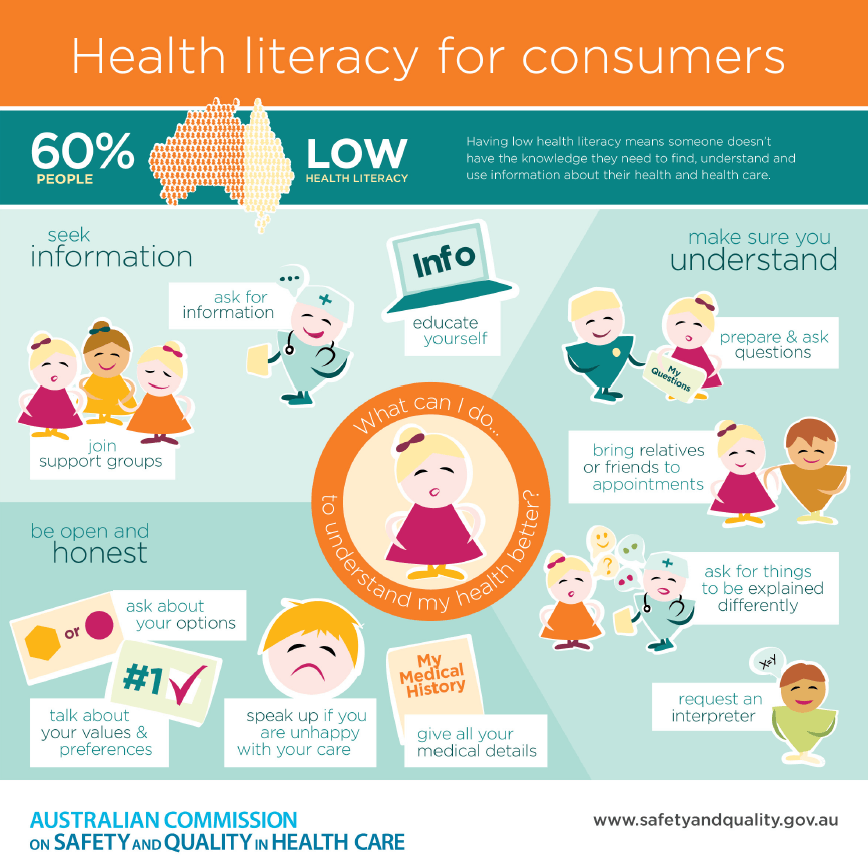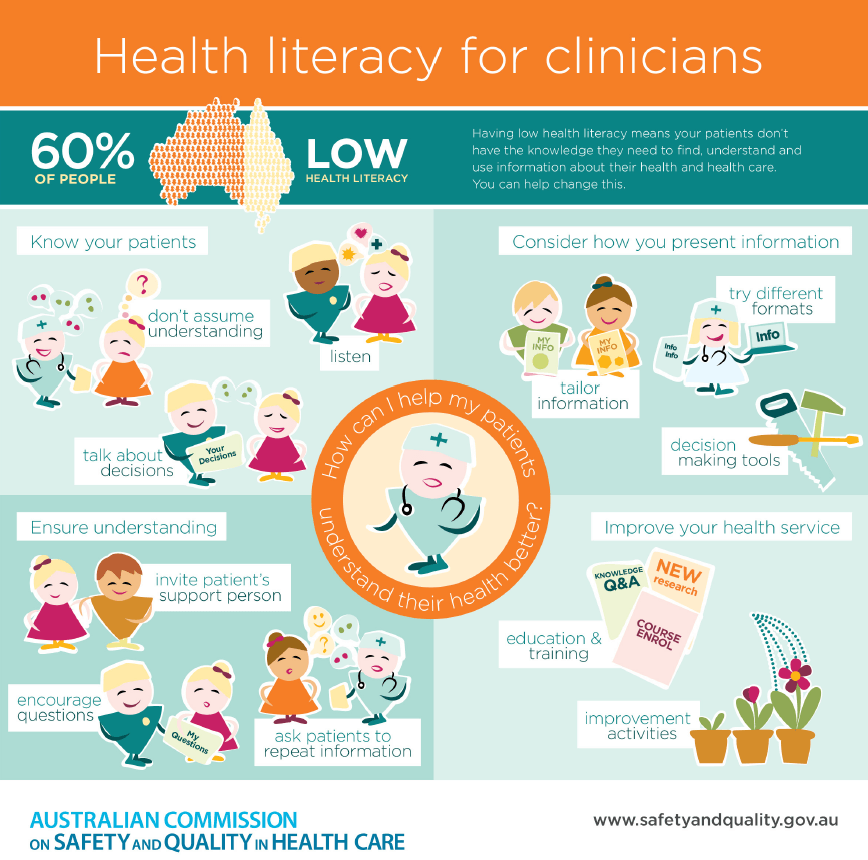
Health Literacy helps to address how people ACCESS, UNDERSTAND and APPLY health information to themselves.
Health literacy encompasses an individual’s health literacy skills, access to information and health services, how services are structured, and how healthcare professionals provide and communicate information. It also looks at the complexity of the health system with the view to help users easily navigate specific services.
Sydney North Health Network approaches health literacy in three specific ways:
- Functional Health Literacy: The individual skills people need to read, write and comprehend information.
- Environmental Health Literacy: The way services are delivered and provide health information.
- Conceptual Health Literacy: The way the health system organises access to information and services.
Research shows 59 percent of Australians have low health literacy levels. This mean many people in Australia struggle to navigate the healthcare system, understand prescriptions and diagnoses, manage their chronic disease and/or provide informed consent. It can also affect people’s ability to make daily decisions in regards to nutrition, exercise and disease prevention.
Everyone can help improve health literacy; here are some resources that could help:
CLINICAL |
COMMUNITY |
|---|---|
Health Literacy helps to address how people access, understand, and apply health information to themselves.
SNHN understands that health literacy is about tapping into the needs of the community and then providing sustainable, peer led programs for these populations.
Sydney North Health Network’s approach to community activation is:
- Building health literacy and individual engagement in proactive health self-management;
- Improving community health outcomes and wellbeing; and
- Delivering evidenced based early intervention strategies that address risk factors.
SNHN’s approach to improving health literacy includes ensuring members of the community have access to information and resources on health topics and available services to enable them to make informed decisions and better manage their health.
A key element of health literacy is collaboration with a range of organisations and stakeholders to ensure a coordinated approach. This includes working with the Northern Sydney Local Health District Community Engagement Team to share information and resources, working with local councils on the development of health resources and navigation tools, and engagement with community development officers to ensure accurate and relevant health information is provided to our communities.
SNHN directly engage a range of community members to gain insight into the needs of our population so that we can develop a targeted approach to health literacy.
Over the past year we have developed and supported numerous initiatives and events aimed at improving health literacy, including:
- Working with Breast Screen NSW to reach vulnerable and culturally and linguistically diverse communities to encourage and facilitate access to screening.
- Working with the Manly Community Centre to reach out to members of our community who are homeless.
- An Aboriginal Women’s Health Check and Expo.
- A Multicultural Disability Services Expo representing the Korean, Mandarin, Cantonese, Japanese, Farsi and Dari communities.
- A Tibetan Women’s Health Forum.
- Working with the Northern Beaches Council on Inclusive Communities.
- The development of a health literacy and information check list.
SNHN has also continued collaboration with the Northern Sydney Institute of TAFE and the Adult Migrant English Program (AMEP) to improve the health literacy of newly arrived migrants and refugees. This program brings local GPs together with the students to increase awareness around accessing a GP and how to effectively navigate the Australian health system.
In addition, this program provides information about accessing after hours medical services, helping new migrants in the Northern Sydney area to get the right care, in the right place at the right time. SNHN has successfully engaged over 500 newly arrived migrants and refugees over the last 12 months.
SNHN will also be focusing community activations moving forward on SNAPO (Smoking, Nutrition, Alcohol, Physical Activity, and Obesity) interventions targeting vulnerable populations and looking towards programs covering areas such as nutrition and smoking cessation programs.
SNHN will also continue to link in with key health promotions such as National Mental Health Week, Cancer Screening, and Palliative Care Week and continue to collaborate with the Northern Sydney Local Health District delivering Health Expos.
2017/18 also looks to deliver an exciting chronic disease self-management tool that will allow the Northern Sydney population health coaching that links in with their GP. This digital health coaching system will then work alongside clinicians who will be alerted when health issues arise.
Moving further into 2017/18, SNHN will continue to support and empower individuals and communities to make decisions about managing their own health and care. We will also continue to liaise with other Primary Health Networks to identify opportunities to collaborate on health literacy projects and initiatives.
North Western Melbourne Primary Health Network have created several resources to help community and clinicians. Watch their Teach Back Method video:


